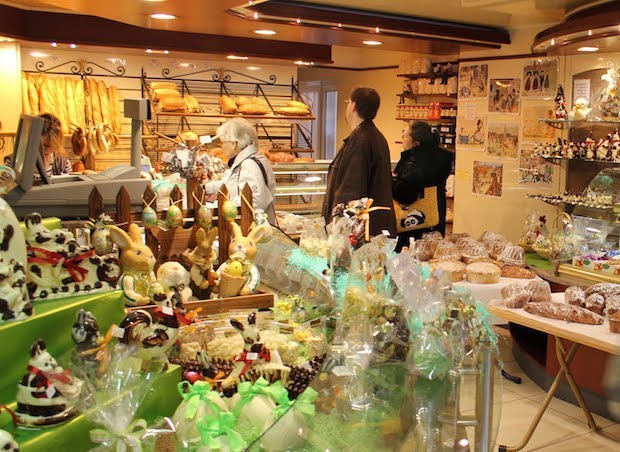Actually it is not that different to Easter celebrations in other mainly Christian countries, the French however as you would expect also have their own individual Easter traditions. Perhaps it may come as no surprise that given France's obvious culinary talents, many of the Easter traditions include and involve food.
Easter is an important holiday in France and there are lots of traditions that go with Easter so be sure to wish all your friends and colleagues an enthusiastic 'Joyeuses Pâques' (Happy Easter) !

Easter Weekend:
Good Friday is typically not recognised as a Bank Holiday in France and it is business as normal. Easter does however consist of a long weekend, and in some sectors, a week or two of holidays but generally it is only the Easter Monday that stands out as different to the normal run of things because every Sunday is still a rest day in France where most large shops and business are closed, unlike the UK these days. In addition to having the chance for a holiday, the French also take the opportunities of Easter to include visiting family and friends, and relaxing.
French Easter Morning:
French children have Easter egg hunts on Easter sunday morning. Eggs are usually chocolate ones and not hard-boiled ones, although the French also play games with raw eggs at Easter. A few Easter games exist, such as competitions throwing and catching eggs and seeing who can toss and catch an egg the longest without breaking it. Another game with raw eggs stems from the Catholic tradition in France. In this game, children each take a raw egg and roll them down a hill (simulating the stone rolling from Jesus' tomb). In this symbolic game, the child whose egg travels the farthest without breaking is the winner.
Easter egg hunts are usually for small chocolate eggs. However, French chocolatiers also have a long-standing tradition of creating oversized ornamental chocolate eggs that are given as gifts. These eggs, like most products from French chocolatiers and patissiers, often look too beautiful to eat!

How Do the French Celebrate Easter with Food:
In addition to the sweets, French families often make very special meals on Easter Sunday. As with all special French meals, it will usually consist of several courses, be accompanied by wine, and finish with a cheese plate and a delicious dessert.
French Easter Menus:
There is a French Easter tradition of serving lamb as the main course on Easter Sunday. While this is not necessarily always the case, many families still observe this tradition by making a rack of lamb braised with an herb rub or sauce. Other main courses would typically be meat, for example a ham or other choice cuts of meat. Turkey, which is very typical of Christmas, would not often be chosen as an Easter main course.
Preceding the main course, a lighter dish is usually served. This may be something like a quiche or perhaps a salad. Though soup is possible, a cold first course is more typical of a traditional Easter menu. Some families may eat both a salad and another first course.
Following the main course, expect a short break in which everyone remains seated at the table drinking wine. This break is usually followed with a traditional cheese plate with baguette. If you are making a French-style Easter dinner outside France, you'll have to rely on a local supermarket for some French cheeses (get a variety: one bleu, one camembert or brie, one harder cheese, and a goat's cheese if you can find it). In France, expect a few popular French cheeses, as well as a few local ones that you may never have seen or heard of before.
Lastly, Easter dinners are topped off with dessert. Very often, the dessert will include some chocolate, but may not be exclusively chocolate, such as a chocolate berry tart or an almond cake drizzled with a chocolate sauce. If you are in France, expect to spend a long time over Easter dinner, it is meant to be enjoyed slowly.
Blog submitted by: Alex at The French Property Network - Cle France.